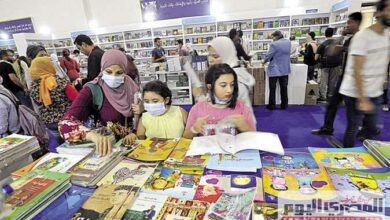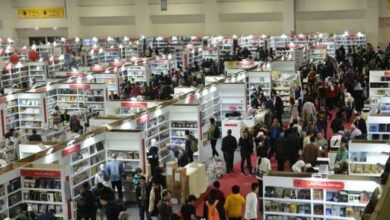Shoehorned between Attaba metro station and a bustling clothes market, Soor el-Azbakiya, Cairo’s famous second-hand book market, is a relic of the golden age of Egypt’s literary movement.
Established early on under Nasser’s presidency, the history of Soor el-Azbakiya is palpable today as one strolls among the many wooden stalls crammed to the ceilings with books.
“Each of the 130 stalls contains at least 5000 books, maybe more,” says Hag Harby, the informal head of the book market. Sitting on a stool outside his kiosk, the 55-year-old sips a glass of steaming hot tea while recalling his life-long attachment to the book market.
“My father and my uncle were among the first book sellers here in the market, and as a child whenever I was not at school I was here working,” he says, revealing a silver tooth. “I began working here full-time at the age of ten, lured by what I thought at the time would be easy money.”
The strategic location of the book market in the heart of Cairo has been a mixed blessing for the book sellers, who have been forced to relocate their stalls six times in the past 20 years. The latest hassle was a three-month closure of the stalls due to the construction of Cairo’s third subway line linking Abasseya to Imbaba.
The government finally allowed the second-hand books vendors to resume business in September 2008, and it constructed the current arabesque woodwork stalls that line the market.
Although it seems like it would be an impossible task to find a specific title amongst the hundreds of thousands of tomes that are piled up among the stalls of the souq, there actually exists a quite efficient, if informal, system to locate anything a reader might want.
First, vendors tend to specialize in certain fields. For example, one vendor might have an extensive collection of medical books, while another will sell exclusively dictionaries, and a third specializes in religious or legal material.
“Nobody imposes a specialization on the sellers,” explains Hag Harby, adding that they “trade in what they love and what they know.” If a particular vendor does not have the book the customer wants, “he will know other vendors who specialize in the same field–maybe Mahmoud, Ali or Said will have it,” adds Harby, clutching his cane.
As to where the books come from, Harby explains that some are sold to the vendors when a bookstore closes, while others are taken from private collections. He adds that “many of the customers here are poor, so they will bring the books they have read to exchange for new ones.”
The market as we know it now is a far cry from its haphazard beginnings.
Standing in front of pyramidesque stacks of novels that mark the entrance of his shop, Sabri el-Serguani recalls how his family got into the used books market in the last years of King Farouk’s reign. “My uncle and my father were itinerant book-sellers who would regularly bring bundles of the most hotly-debated books of the day to the Motatia Café near the old opera house,” says el-Serguani.
“The intellectuals sitting in the café were always vying to see who was the smartest by engaging in fierce literary debates about the books that my father and uncle were selling,” he continues. After touring the cafes, his father and uncle, along with other book merchants, would carry their leftover books and rest against the wall (in Arabic “soor”) of Azbakiya park.
Sabri explains that over time the area developed a reputation as a spot to buy used books, and so both vendors and customers began to gather along the walls of the park. “Nasser would regularly pass by the park in his motorcade, and one day noticed the booksellers. He immediately told his aide to register and license all of the vendors and ordered that stalls be constructed for them within 24 hours,” relates el-Serguani.
Sadat was a frequent visitor to the book market, and, according to el-Serguani, “he gleaned much of his famed knowledge of languages and philosophy from the books he bought in Soor el-Azbakiya," and this knowledge eventually enabled him to lead Egypt to victory over Israel.
Business seems noticeably slow for Thursday evening with few customers to be seen buying books from the market’s vendors. “It’s hard to make ends meet, particularly in the midst of an economic recession,” says Hag Harbi. Picking up a leather-bound volume and dusting it off with his palm, he declares, “I’m not worried though because books will always remain the origin of knowledge.”




